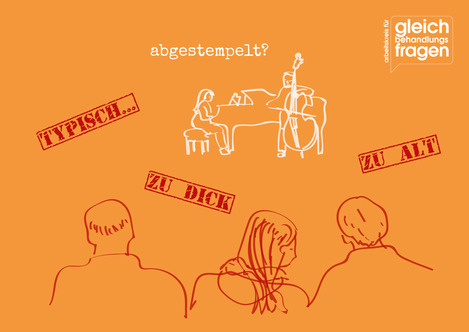Discrimination
Universities are not discrimination-free places: individual or structural unequal treatment and harassment do unfortunately occur in everyday university life.
The task of the Working Group on Equal Opportunities (AKG) is to prevent discrimination and to advise and support all members of the University as well as entrance applicants in this regard.
Discrimination can never have a professional or pedagogical basis and is not defensible on the basis of “artistic freedom”!
Discrimination is based on power inequalities, asymmetries and hierarchies in society, which are also entrenched in universities and have an effect there. “Discrimination” means effectively treating people less favourably and disadvantaging them because of their
- gender
- (supposed) ethnicity/race
- religion or worldview
- age
- sexual orientation
- disability
Harassment based on any of the above-cited characteristics is discrimination too.
Discrimination often occurs not just based on a particular characteristic, but on the combination or concurrence of different characteristics, which in turn lead to specific discrimination. Here, the Austrian Equal Opportunities Act (B-GlBG) refers to “multiple discrimination” (§ 19a) and, in scientific and activist contexts, the term intersectionality is often used.
Discrimination can occur directly or indirectly:
Direct discrimination occurs when a person receives, has received or would receive less favourable treatment than another person in a comparable situation for one of the above reasons.
Indirect discrimination occurs when seemingly neutral regulations, criteria or procedures can put a person at a disadvantage, unless there are any legal justifications for them.
Issuing instructions to discriminate is discrimination too.
If you are being discriminated against, please contact the Working Group on Equal Opportunities (AKG): we will help you!
If you witness discrimination, don’t look away! Support the victims and refer them to the AKG.
We take rapid, discreet action!
Discrimination can manifest in the following types of behaviour:
Disability
- The non-implementation of reasonable building conversion measures*
- The inclusion of professionally irrelevant or unjustified physical abilities and/or normative behavioural patterns of people e.g. in evaluations of artistic and/or scientific activities or in job advertisements
- Refusal to transport mobility-restricted people on official trips or excursions
- Disability-hostile, degrading remarks to or about a person, offensive remarks or pretended “jokes”
- Intrusive and degrading questions about a person’s body, physical abilities, sexuality, behaviour patterns, diagnoses and (supposed) “causes” of disabilities and/or illnesses
- Targeted refusal to provide alternative examination methods and/or study materials for students who are entitled to them
- Targeted prevention of the participation of people with disabilities and/or illnesses by creating a hostile atmosphere
* This does not constitute discrimination if the said conversion measures are illegal e.g. owing to monument protection regulations
Racism (ethnicity)
- Verbal remarks or gestures to or about a person, or a group of people, which refer to racist stereotypes e.g. regarding their abilities, their clothes, their appearance, their body, their skin colour, their behaviour, their (supposed) culture and/or their (supposed) origins, as well as stereotypical portrayals in artistic works (e.g. “blackface”)
- Racist insults, verbal abuse and/or pretended “jokes”
- Intrusive, unwanted questions about a person’s (supposed) origins, their language proficiency, their residence status and/or duration of stay
- Objectionable touching e.g. touching a person’s hair
- Creating, distributing and/or displaying racist pictures or texts
- Non-recognition of the equal value, with regards to content, of a scientific and/or artistic examination of racism
- Reengagement in National Socialist (Nazi) ideology and activities, hate speech, or calling for violence or discrimination
Age
- Verbal remarks or gestures in reference to a person’s age and/or stereotypical assumptions concerning age e.g. relating to their abilities, their body, their “reliability” and/or “expertise”, and their behaviour
- Objectionable, degrading remarks, insults and pretended “jokes” relating to the age of a person
- The professionally unjustified inclusion of age in the evaluation of artistic aptitude and/or scientific work
- Remarks about a person’s supposed “forthcoming retirement” or questions about the CV of entrance applicants, students or staff that are aimed at denying their motivation and/or their abilities
Sexual orientation*
- Verbal remarks or gestures to or about a person, or a group of people, based on stereotypes regarding sexual orientation, e.g. relating to a person’s appearance, their body, their health, their behaviour and/or their abilities
- Objectionable, degrading remarks, insults and pretended “jokes” relating to a person’s sexual orientation
- Objectionable, intrusive questions about a person’s sexual practices, marital status and/or forms of relationship
- Persistent, unwanted outing of a person as homosexual, bisexual and/or queer
- Denigration of homosexual, bisexual and/or queer relationships, registered partnerships and families
* Discrimination against or harassment of transgender, intersex and non-binary people is discrimination or harassment based on gender, not based on sexual orientation.
Religion
- Verbal remarks or gestures to or about a person, or a group of people, based on religious stereotypes e.g. relating to a person’s appearance and clothing, their abilities, their food, their behaviour and/or their (supposed) culture (e.g. also regarding the social position of women or a supposed “disposition for violence”)
- Objectionable, degrading remarks, insults and pretended “jokes” relating to a person’s religious affiliation
- Failure to be considerate of religious holidays and religious services and/or prayer times
